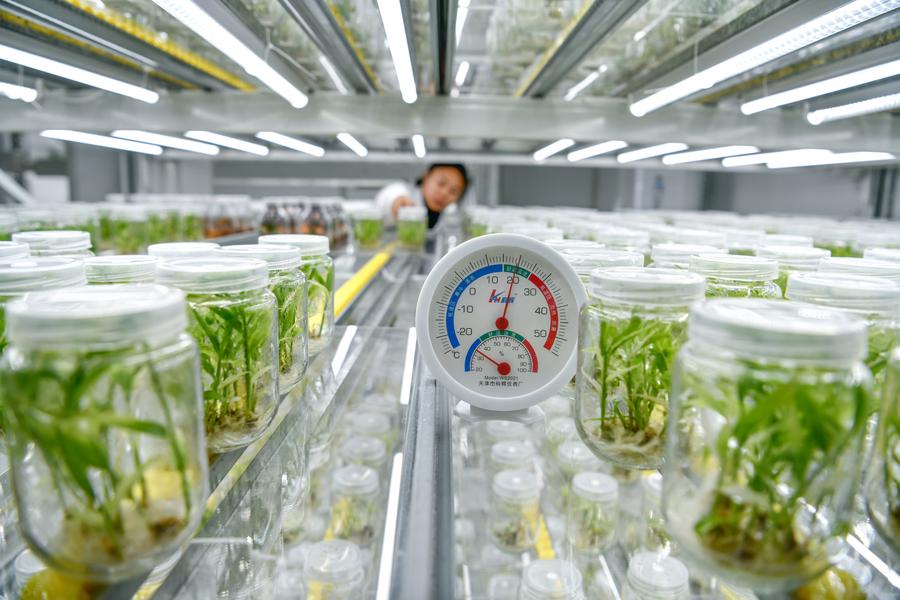
 0 Comment(s)
0 Comment(s) Print
Print E-mail Xinhua, March 23, 2025
E-mail Xinhua, March 23, 2025

A worker checks the growth condition of seedlings at a seedling greenhouse in Kaiyang County of Guiyang, southwest China's Guizhou Province, May 23, 2023. [Photo/Xinhua]
Inside a smart greenhouse in Chengdu, the capital of southwest China's Sichuan Province, two robots, swiftly zipping through ridges between fields, were taking patrol training. With their high-definition cameras, these robots can snap real-time shots of crops' growth and send images straight to the cloud.
"After integrating with the DeepSeek large model, our team trained the robots through tens of thousands of images to improve their pest identification accuracy, which has exceeded 80 percent," said Wu Yuanqing, the robots' developer.
Once the accuracy is improved, these robots can help farmers increase their decision-making precision in planting and efficiency of agricultural production, Wu added.
The rise of AI-powered agriculture in China highlights the government's continued efforts to modernize its agricultural sector to accelerate rural revitalization, which profoundly impacts the lives of over 460 million people in rural areas.
The Chinese government has introduced multiple policies to promote smart agriculture development for years. In this document for 2025, Chinese policymakers have, for the first time, identified the development of "new quality productive forces in agriculture" as a top priority.
The document underscores the need to increase support for smart agriculture and calls for expanding the use of technologies such as AI, big data and low-altitude systems in agricultural production.
Maoming, a well-known lychee-growing city in south China's Guangdong Province, is a premium example of how age-old practices meet with cutting-edge technologies to create a smarter, more efficient, precision-driven local industry.
In February, the city completed deploying the DeepSeek model into its local AI assistant platform, integrating more than five million data points, including a lychee disease prevention database and detailed local meteorological records.
So far, 69 sets of 5G-powered Internet of Things sensors have been installed across 20 lychee-growing towns in Maoming, according to Xu Hong, an official with Maoming's agricultural and rural affairs bureau. These facilities monitor everything from soil moisture to air temperature, generating real-time insights that allow farmers to anticipate and mitigate risks before adverse weather takes a toll.
Farmers in Maoming also dived into learning and applying AI technologies in lychee cultivation. Zhang Xianfeng, a local farmer, has recently turned to an AI-powered assistant for guidance as persistent wet and chilly weather threatened Zhang's lychee. Within seconds, the system provided a tailored management plan for her.
"In the past, we relied entirely on experience to determine the flowering period of crops. Fertilizers were applied by instinct, and we often reacted too late to disease outbreaks," Zhang said. "Now, solutions provided by AI help us tackle these challenges immediately and accurately."
Fueled by a surging demand, AI in agriculture has expanded rapidly. In 2021, China's "AI plus Agriculture" market was valued at approximately 68.5 billion yuan (about 9.55 billion U.S. dollars). That figure is projected to exceed 90 billion yuan by 2024, marking an average annual compound growth rate of around 10 percent, according to the Qianzhan Industry Research Institute, a Chinese think tank.
While still in the early stages, experts are optimistic about AI's future in agriculture. "AI holds great potential in precision farming, pest identification and control, automated agricultural machinery, and supply chain optimization," said Li Zhan, a professor at Southwest Jiaotong University.
Li noted that domestic AI technologies like DeepSeek will significantly enhance agricultural production efficiency, resource management accuracy, and product quality safety, driving the intelligent and sustainable development of agriculture.
However, challenges still remain. Issues such as inconsistent data collection, privacy concerns, and limited farmer adoption continue to curtail the full potential of AI in this field.
More efforts are needed to strengthen infrastructure in rural areas to lower the barriers to AI access, said Liu Jingjing, a researcher at a research center under China's Ministry of Agriculture and Rural Affairs.
Liu stressed that it is vital to cultivate more AI talents to facilitate the integration of new technologies into agricultural practices.